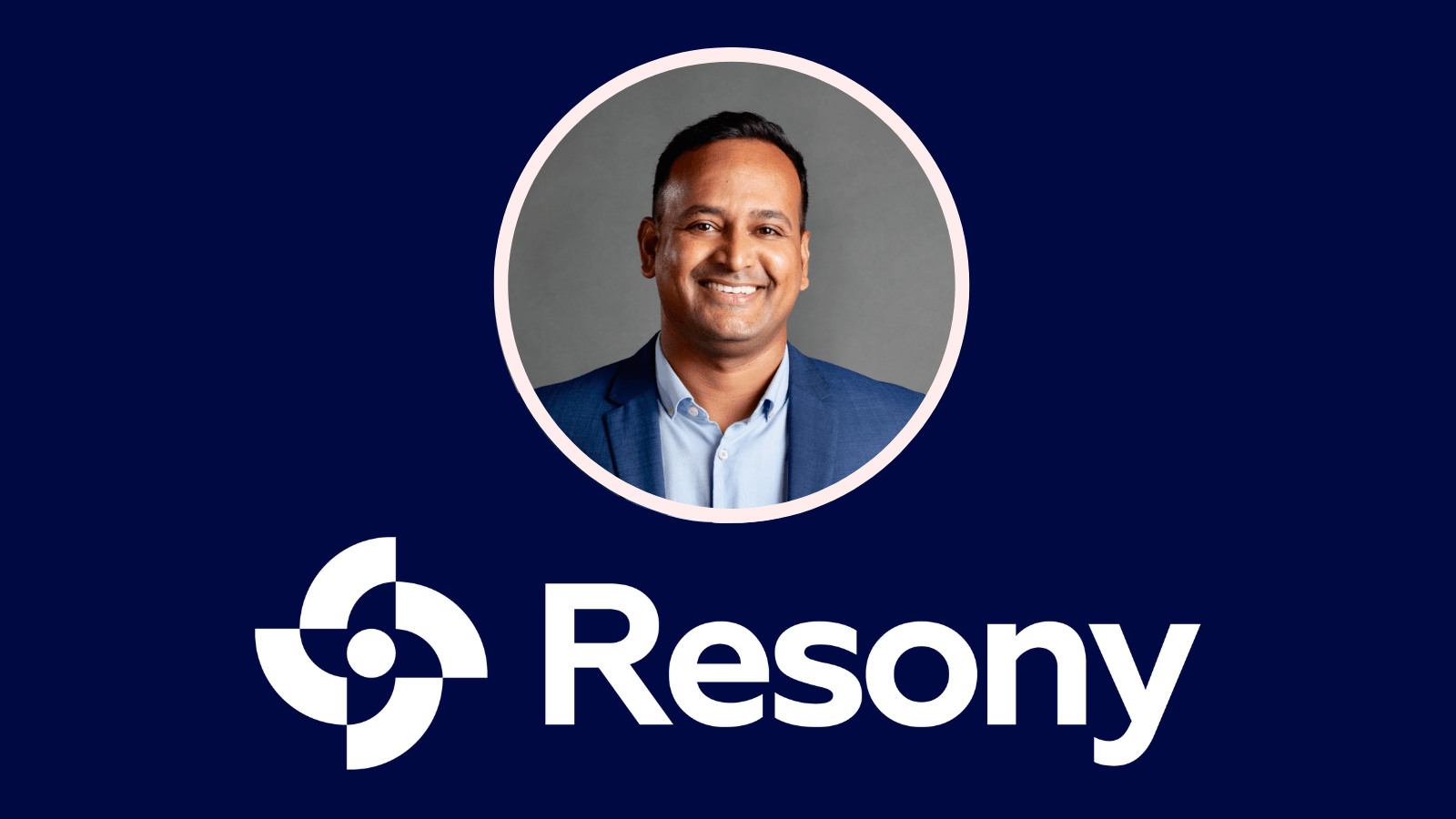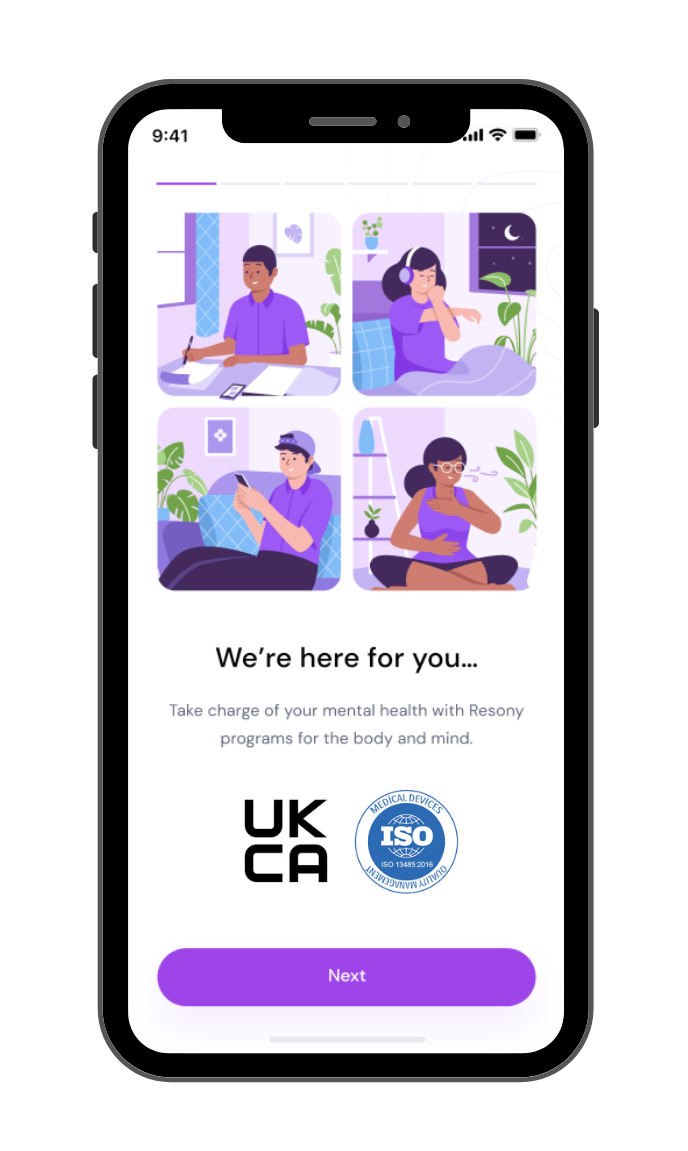
Company of the Month – Resony Health
Resony Health is a young digital health company with a mission to improve access to effective mental health support.
We spoke to Ravi Janapureddy, Co-founder and CEO, about their global plans to allow people to access the highest quality mental health support via a smartphone.
A personal mission
Ravi Janapureddy’s mission to improve mental health is personal. Ten years ago he was working in Germany as a management consultant in financial services. The extremely long hours and monotonous work led to exhaustion and burnout, and he was forced to take a career break and return to his native India to recover. It was during this time that he began exploring opportunities for more mission-driven work. An invitation to apply to the Oxford University MBA programme set him on a course to the UK and, after completing the MBA, he decided to follow his passion for mental health by joining Zinc VC, a venture builder to tackle society’s toughest issues.
A vision for effective support
Ravi can also thank the Oxford Business School network for meeting his co-founder, Dr. Peter Gruenewald, a clinical specialist in mental health. Together, they’ve defined three requirements for their vision for what effective mental health support means: affordable, instantly accessible, and evidence-based. On the first point, Ravi says:
“If it’s not affordable, then we risk the disruption of health equity, where people with privilege of access can quickly get the latest solutions and others are left behind.”
In order to achieve instant access and affordability, Ravi and Peter saw digital technology as the clear answer:
“For the past 200 years, there’s really just been two ways to treat common mental health conditions. First – medication, which can sometimes have serious side effects, and isn’t necessarily the best choice of treatment for many. Second – therapy with a qualified person. But there is a worldwide shortage of qualified mental health professionals and waiting lists can mean people wait a long time to get treatment in the NHS. What we’re doing is using technology as a third way for people to gain instant access to mental health care.”
Clinical-grade treatment
Digital therapeutics (DTx) is a relatively new category of medical interventions, delivered directly to patients using evidence-based, clinically evaluated software. This can encompass treatment, management, and prevention of a broad spectrum of diseases and disorders.
 Resony creates digital therapeutics for mild-to-moderate mental health conditions like anxiety, depression and sleep issues.
Resony creates digital therapeutics for mild-to-moderate mental health conditions like anxiety, depression and sleep issues.
Their first app uses evidence-based interventions to take users through a six-week programme to treat anxiety in adults. The programme combines psychological principles such as cognitive behavioural therapy, with physiological techniques such as breathing and muscle relaxation exercises.
What sets Resony apart from many other digital solutions for mental health, is their focus on providing clinical-grade treatment without the continuous need for a clinician. They gained regulatory approval as a Class 1 medical device from the Medicines & Healthcare products Regulatory Agency (MHRA), and have launched clinical studies to prove the effectiveness of their programme at reducing anxiety.
The first real world study – with 200 users – showed that 70% of people using the app demonstrated statistically significant improvements in wellbeing. A second feasibility study with 86 people saw 65% of users’ anxiety reduce from a moderate intensity to mild intensity, as measured on the Generalised Anxiety Disorder Assessment (GAD-7) scale.
They have also been involved in a pilot for NICE’s new Early Value Assessment (EVA) process and, as part of this, are working their way through an evidence generation plan, with further pilots and studies pencilled in for later this year.
Support to thrive
Those upcoming pilots have largely come through introductions to NHS Trusts and providers gained through being part of the MedCity Community:
“MedCity was able to make tailored introductions to Trusts and other bodies that were really useful to us at an early stage, and those conversations are now progressing to pilots that will help us build our evidence base. On top of this, the Community came at the perfect time for us. Innovation and being a founder can be a lonely journey, especially as the Covid pandemic came along. Having the opportunity to meet online with peers, and benefit from the regular programme of expert speakers made a huge difference.”
As well as MedCity, Ravi has been pleased to benefit from a number of accelerators and other programmes. From the Zinc VC incubator, to the Bayer G4A programme (which gave them access to funding, investment and mentorship) and The Hill Oxford (an innovation catalyst embedded within Oxford NHS Trust), they’ve had numerous supporters.
That support also extends to funding, with £350k raised to date. As well as funding from Bayer, they’ve had grants from Innovate UK and CPI, as well as investments – including from friends and family in the early days.
With ambitious growth plans – they aim to hit £1 million revenue in the next 18 months – Resony are about to embark on a drive to raise a further £700k of funding.
Route to market
Recognising the challenges of selling a healthcare product in the UK, Ravi doesn’t expect this revenue to come from the NHS initially.
“The NHS is a large healthcare system, full of potential, but it’s got its fair share of difficulties in getting market access. It takes a long time, and a lot of resources. In the UK, we don’t have the complete pathways for digital therapeutics in mental health, with most GPs only able to prescribe medication or refer to a therapist.They can’t prescribe apps yet because we’ve not yet built the foundations for prescription digital therapeutics, unlike a few other countries.”
With this in mind, the route to market for Resony is multi-pronged. As well as working with NHS Trusts and NICE, they are also piloting their app with a number of employers for use as an employee benefit, in discussions with insurance companies, and they are well on the pathway to securing reimbursement of their app in the German healthcare system.
“Germany is the first country in the world to have national-level reimbursement for proven healthcare apps, with other EU countries quickly catching up. This, combined with my familiarity with Germany and our connection with Bayer – a German pharma company – made Germany a clear target, as we look to grow revenue.”
Future growth
With developments well underway in two countries, Ravi sees global potential for Resony’s tools:
“Close to 400 million people worldwide suffer from anxiety disorders. In Western economies, 50% of them do not receive access to treatment at all, and in lower-to-middle income countries, close to 85% with mental health conditions never receive treatment.
Because we’ve put a lot of up-front work into designing our clinical-grade interventions, scaling and applying it to other countries is actually quite a quick task. We were able to complete translation and testing of our German-language version in just 2-3 months.”
As well as targeting other countries, Ravi sees clear potential to scale to target more conditions:
“Anxiety, depression, sleep, and chronic pain are four conditions which can be addressed by a common psychological factor framework, so these are all areas we’re looking at. They are also all conditions where providing earlier, easier access to clinical-grade interventions would avoid a lot of people from needing higher levels of care in the NHS. Support like this can be a really cost-effective measure, so I hope that giving people early access – perhaps via GPs – is the direction the UK is heading.”
Find out more: resony.health